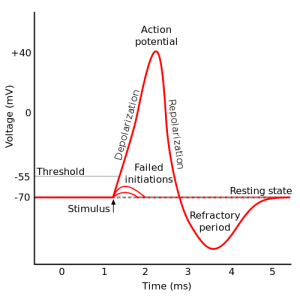Depolarization is the process by which the neuron‘s membrane potential increases positively. Since the neuron normally sits at a potential of -70 mV, increasing the potential towards 0 mV decreases the total polarity of the cell. During an action potential, rapid depolarization occurs after the cell initially depolarizes enough to reach threshold potential. After reaching threshold potential, the voltage-gated sodium channels at the base of the axon open to allow the highly concentrated sodium ions outside of the cell to spill in. This then depolarizes the environment around the adjacent sodium channels upstream along the axon. This causes those sodium channels to open. The action potential continues in this manner by way of a positive feedback loop involving depolarization and the opening of sodium channels to further depolarize the cell. At the peak of depolarization, the neuron reaches a membrane potential of +30 mV. Repolarization follows depolarization.

3 thoughts on “Depolarization”